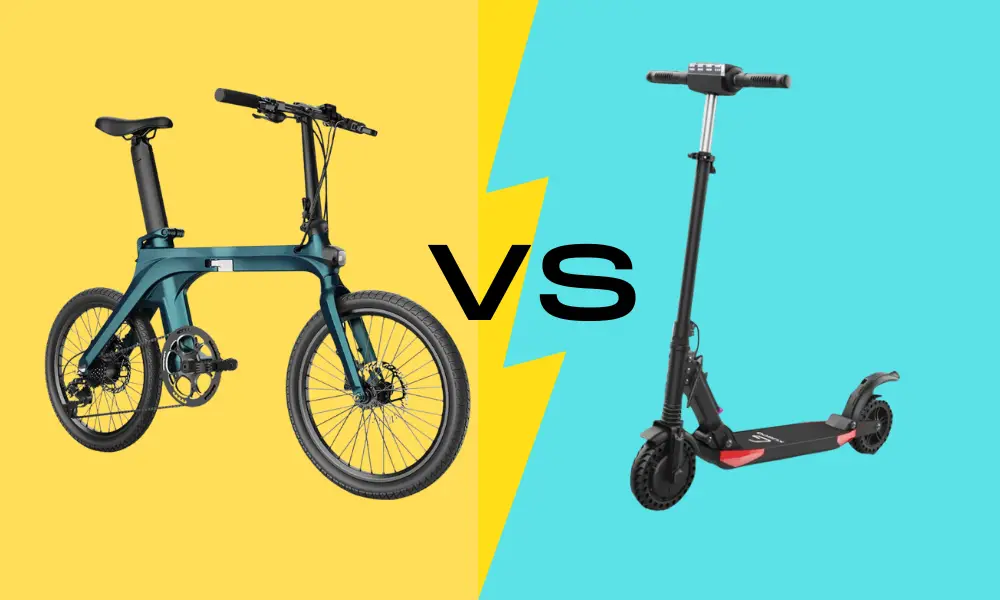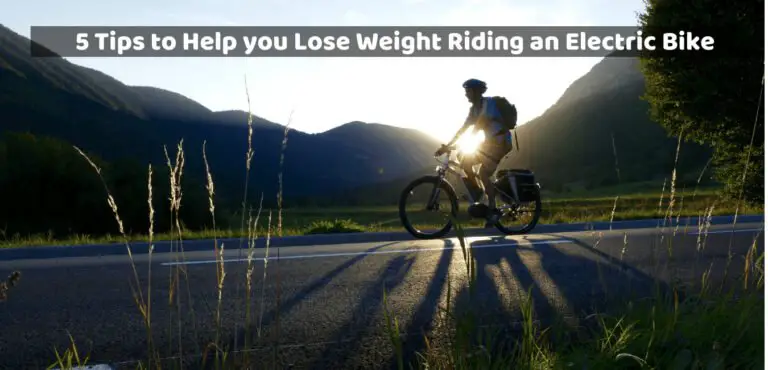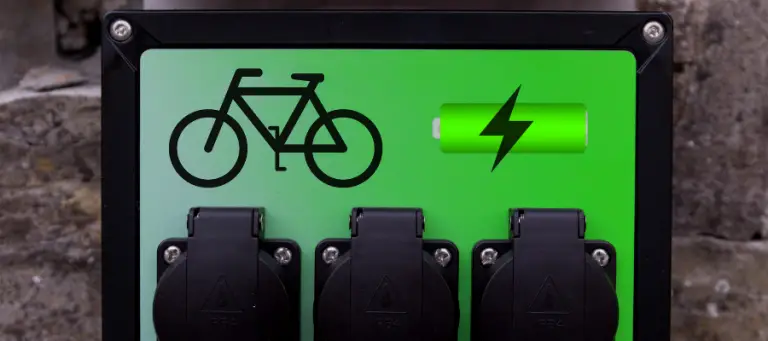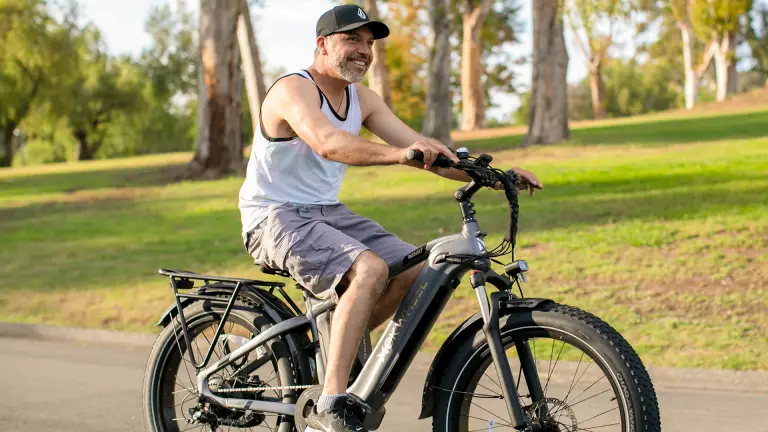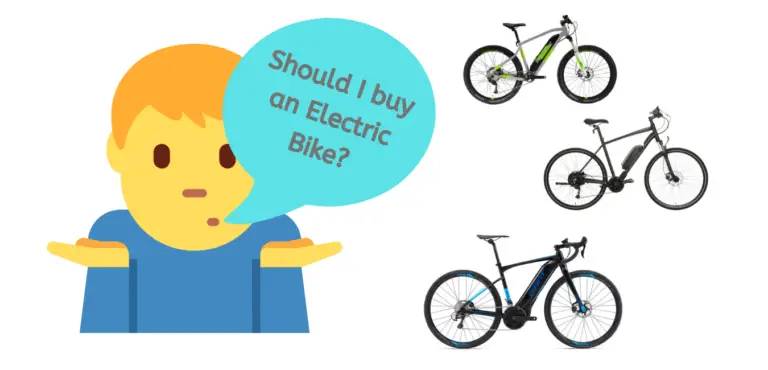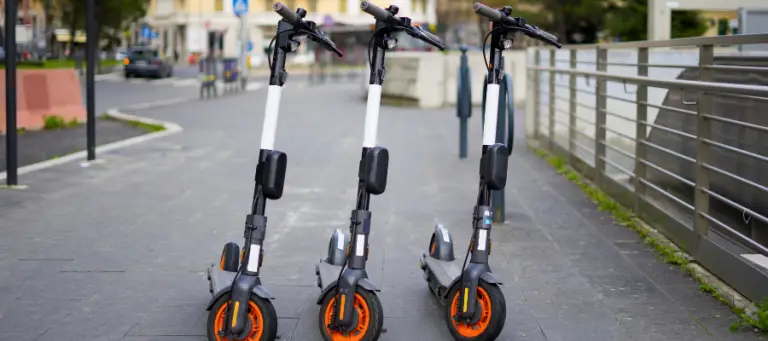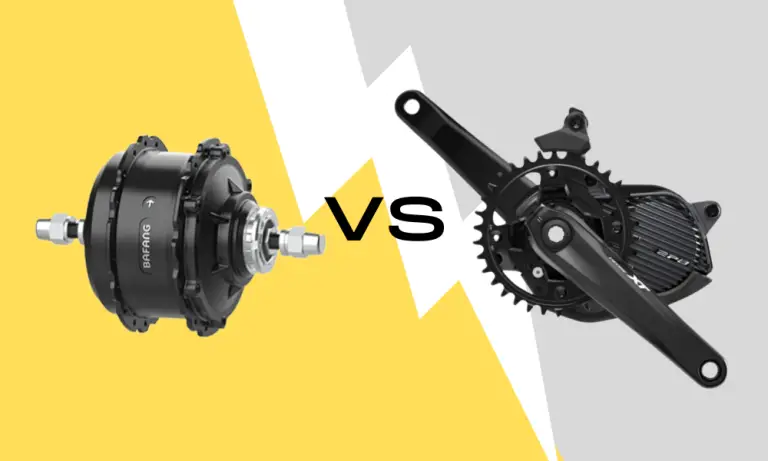When you purchase through links on our website, we may earn a commission. Affiliate disclosure.
This is a question I get asked often – what are the pros and cons of riding electric bikes vs electric scooters? Both have advantages and disadvantages and are suitable for different people with different abilities. In this article, we’ll compare the two, exploring factors such as cost, range, speed, comfort, and practicality to help you decide which option is more suitable for you.
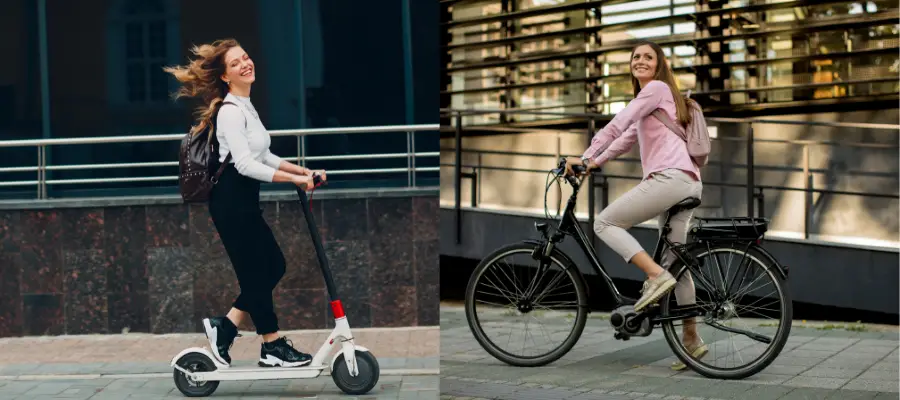
Cost
Prices for electric bikes generally start at around £500 to well over £5000 (or $500 to over $5,000 in the US), depending on the brand, features, and build quality. High-end models can offer greater battery range, better components, and advanced features, while budget options may have more basic specifications.
Electric scooters are usually more affordable than e-bikes, with prices starting from as little as £200 and going to over £3000 for high-performance models ($200 to over $3,000 in the US). These prices will vary greatly based on the scooter’s motor power, battery capacity, components and additional features.
The winner here is electric scooters. E-bikes are great, but when it comes to price, they can’t compete. E-scooters are always the cheaper option unless you opt for one of the higher-performance models. Cheap electric bikes usually have limited features and small batteries.
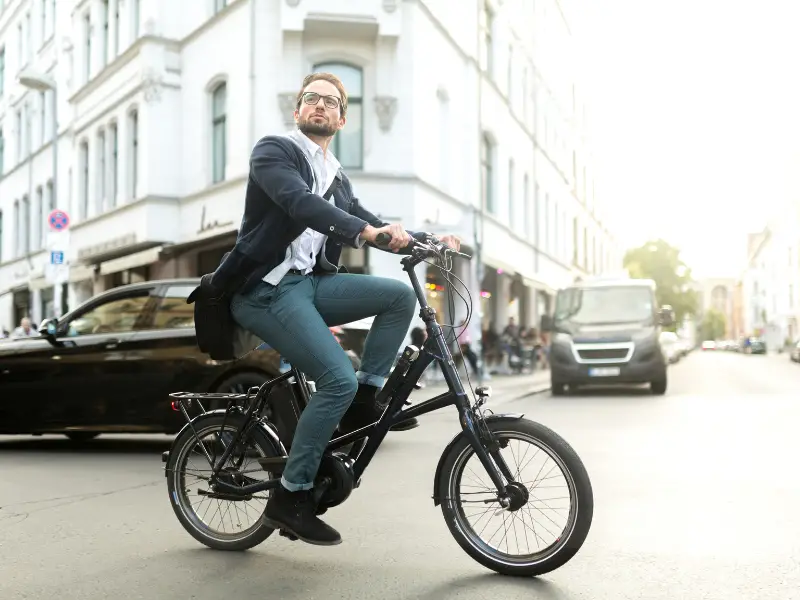
Range
The range of an electric bike depends on factors like battery capacity, rider weight, terrain, rider pedalling input and level of pedal assistance. Most e-bikes will give you a range of between 20 and 70 miles per charge, but if an e-bike runs out of battery power, you can always pedal it to your destination.
Unlike an electric bike, which relies on motor power and rider pedalling input, e-scooters rely solely on the motor and typically have a shorter range than e-bikes, averaging around 10 to 30 miles per charge. This makes them more suitable for shorter commutes and city trips. If you run out of battery power on an e-scooter, you will have to push it home.
The winner here is electric bikes. If you want a long-range e-scooter, you’ve got to spend a lot of money, and it will be very bulky and heavy. You can easily extend the range of an e-bike considerably by pedalling and using lower power settings. Whereas e-scooters don’t have this luxury.
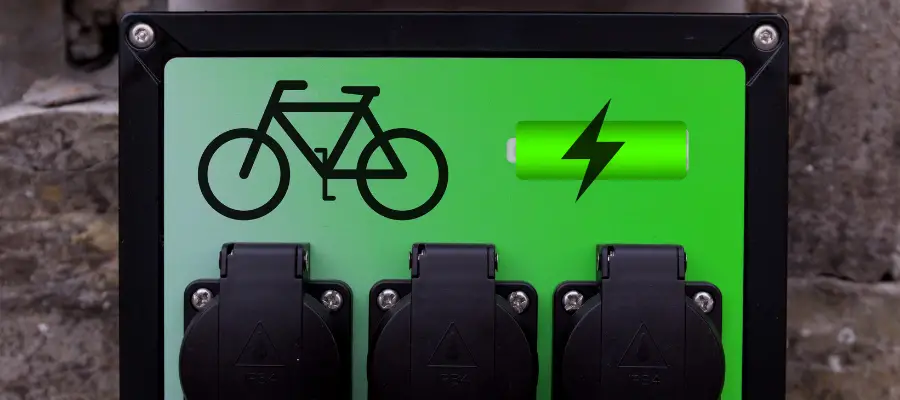
Speed
Electric bikes are limited by law to a top speed of 15.5 mph in the UK and up to 28 mph in the US (depending on the class and local laws). This makes them faster than most electric scooters, allowing quicker travel times. In addition, you can still pedal beyond the motor cut-off point if you want.
Most electric scooters reach top speeds of between 15 and 25 mph. Although slower than e-bikes, they are still much quicker than walking. Some high-performance electric scooters can reach speeds of 60 mph, but these are very niche products aimed at adrenaline junkies.
The winner here is electric bikes. For a higher average speed and getting to you from A to B quickly, you just can’t beat an e-bike. Sure, some e-scooters are very quick, but most are limited to 15 mph in the UK.
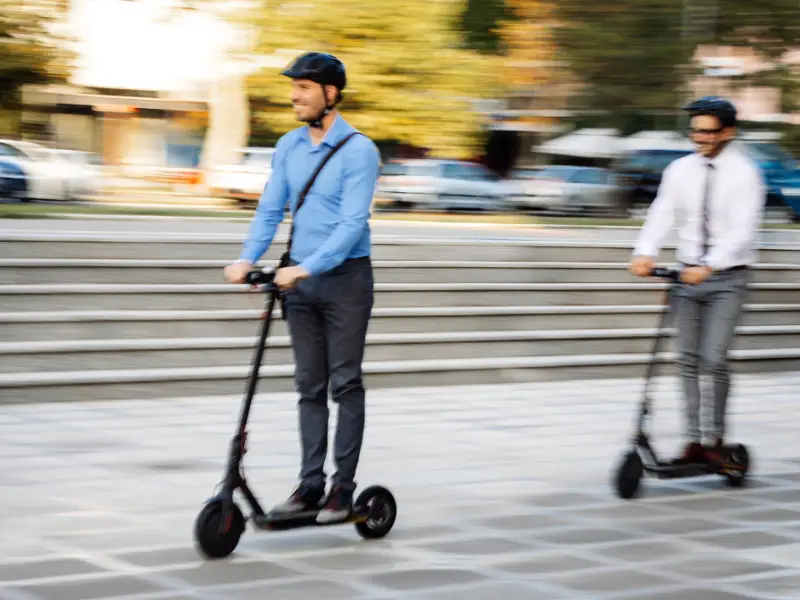
Hill Climbing
Most electric bikes will get the rider up any hill if the rider is pedalling. Some more powerful e-bike motors will even take you up moderate climbs without pedalling.
Because an electric scooter doesn’t have the benefit of rider assistance, the motor is doing all the work. You may have to push the scooter uphill if you’re a heavier rider. I weigh around 230 lbs and have tested e-scooters ranging from 250w to 1200w. Small motors struggle even on slight inclines; unless you’re fairly light, you’ll need to consider a more powerful model.
The winner here has to be electric bikes. If you’re a heavier adult like me, the only suitable e-scooter will be producing more than 1000w. If you live in a flat area, then it’s not so much of a problem.
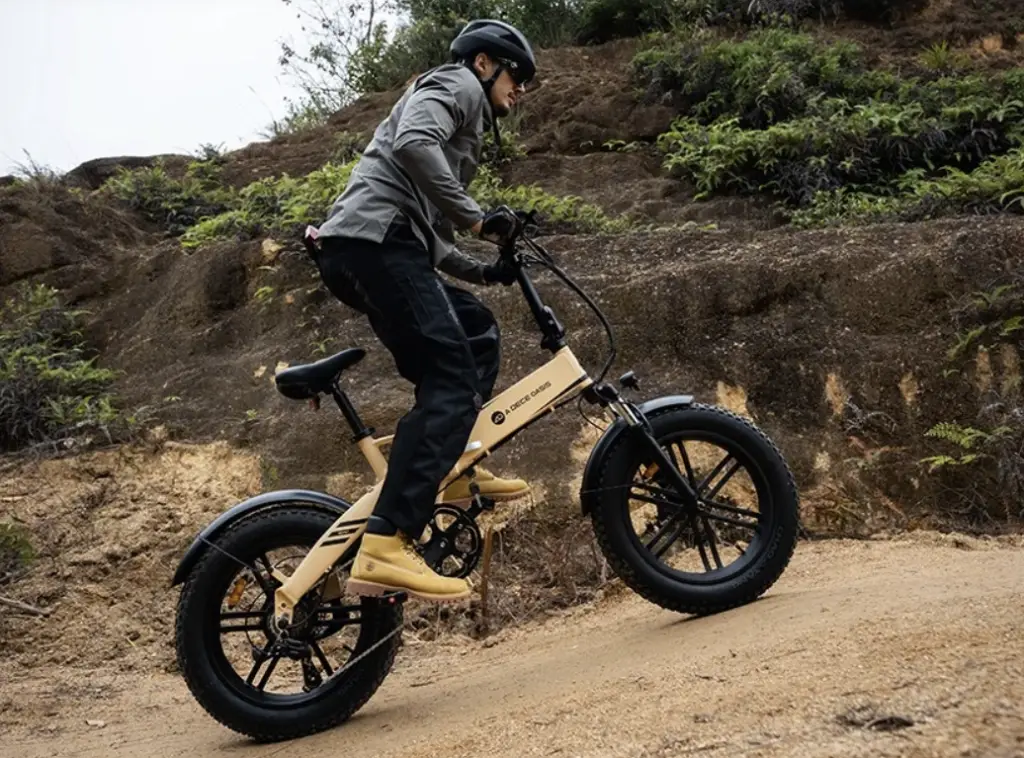
Comfort
E-bikes provide a more comfortable, seated upright riding position, larger wheels, and sometimes suspension. They also offer a more natural riding experience, as you can pedal and shift gears like on a traditional bike.
Electric scooters are usually ridden standing up, which some riders may find difficult on longer journeys. In addition, they have smaller wheels that don’t soak up bumps and limited suspension travel. They’re more suitable for short trips but might not be the best option for long-distance travel. Many e-scooters have the option of a seat, which can help with comfort.
The winner is e-bikes. I have ridden both, and electric bikes are much more comfortable. This is a personal preference, though.
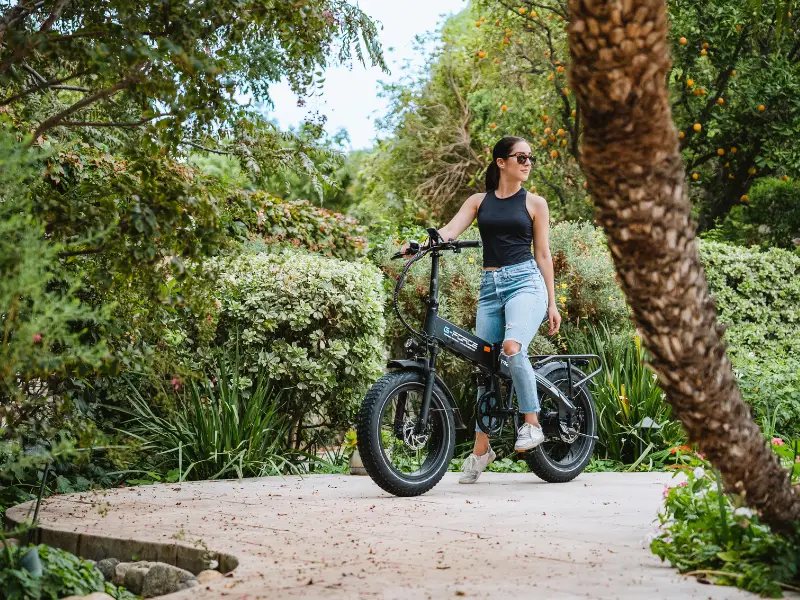
Practicality
Electric Bikes are versatile and can be used for commuting, leisure riding and even exercise. They’re also great for riding on varying terrain and are more stable due to their larger wheel size. A massive choice of folding e-bikes is available if the size is a consideration.
You can also use electric scooters for commuting, as they are highly portable, easily folded down, carried onto public transport, or stored in small spaces. They’re ideal for city dwellers and those with limited storage space.
The winner here is it’s a tie! Both e-bikes and e-scooters are practical forms of personal electric transport. Although full-size electric bikes are not as portable as electric scooters, plenty of folding options are available.
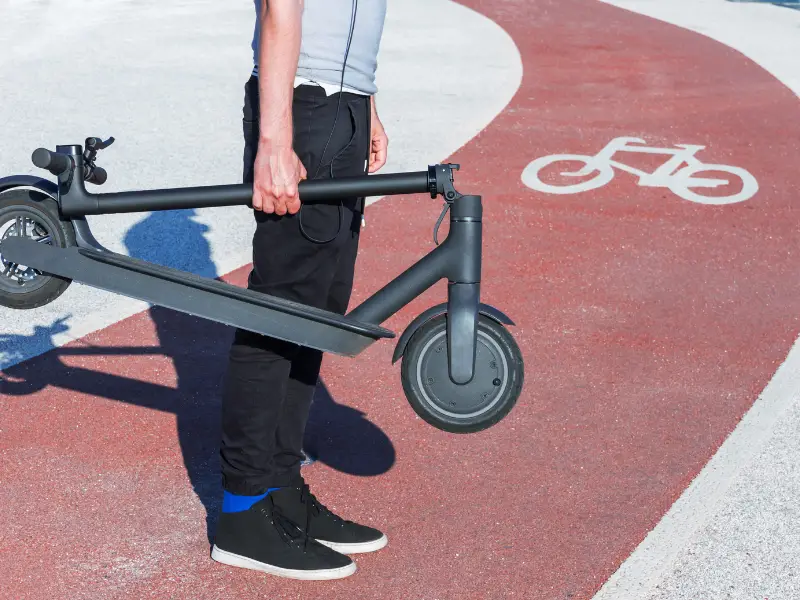
Safety and Handling
Most electric bikes are based on a traditional bicycle frame design that has been around for over one hundred years. The large wheels roll over potholes, kerbstones and other obstacles much easier than the small wheels on e-scooters. Wider handlebars offer better control when negotiating tight turns, and powerful hydraulic brakes provide good stopping power.
Electric scooters have small diameter wheels, which can make the handling feel a little twitchy and nervous. Obstacles like potholes should be avoided at all costs, and great care should be taken in the wet – I have personal experience with this!
The winner here is electric bikes, hands down! As much as I enjoy riding e-scooters, I always feel nervous, especially at higher speeds. I’m consciously aware of the handling limitations.

Fitness
This is a contentious issue in the electric bikes vs. electric scooters argument. E-Bikes are generally considered the better fitness option unless you are using a powerful electric bike that can be ridden like a moped (throttle and no pedalling).
If you’re using an electric bike in the UK or Europe, then road-legal e-bikes need to be pedalled by the rider to activate the electric assist. Even when the motor is helping, you are still burning some calories. Studies suggest the average e-bike rider is getting the equivalent of exercise to a brisk walk, which is great for overall health.
Conversely, electric scooters do not require much physical effort apart from controlling and maintaining the standing riding position. Evidence suggests you will burn some calories when riding an e-scooter, but not as many as riding an e-bike.
Electric bikes are the winner here. Much research has been done on the benefits of riding electric bikes, and the evidence is clear – riding an e-bike is good for fitness and general health as long as you’re pedalling. E-scooters may provide negligible benefits, but not on the same level as riding an e-bike. Read this study on e-scooters for more info.

Legal Restrictions
E-bikes are subject to different regulations depending on the country and local laws. In many places, they are treated like traditional bicycles, allowing them to be used on bike lanes without a license or insurance.
Legal restrictions for electric scooters also vary by location, and in some areas like the UK, they may not be allowed on bike lanes or public roads unless they are part of an e-scooter hire scheme. It’s crucial to check your local laws before purchasing an electric scooter.
The winner is electric bikes. Unfortunately, some countries still haven’t updated their laws to include e-scooters, the most notable of which is the UK. Riders of electric scooters in the UK risk having their scooter confiscated, fined, and their driving licenses endorsed, although in some areas, they are accepted and generally left alone by the police.

Conclusion
So, is there a clear winner in the electric bikes vs electric scooters argument? Both electric bikes and electric scooters can offer a viable form of transport. At the end of the day, it boils down to your personal preferences and physical abilities. Anything that gives people independence and freedom from the shackles of the internal combustion engine is a good thing in my book!
You will need to consider the legal implications when making your choice. Rules and regulations for e-bikes and e-scooters can differ significantly between the UK and US, and even within specific states or cities; it’s important to research your local laws before purchasing. You don’t want to find yourself on the wrong side of the law and face possible prosecution or having your e-bike or scooter confiscated.
My verdict on this is electric bikes all the way. I have ridden many different e-scooters over the years, and I can see the appeal, but I won’t be swapping my e-bike for an e-scooter any time soon!
Thanks for reading. If you have any questions about the topics featured in this article. Please leave a message in the comments section below.

